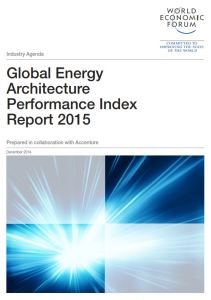Join getAbstract to access the summary!

Join getAbstract to access the summary!
World Economic Forum
Global Energy Architecture Performance Index Report 2015
Industry Agenda
World Economic Forum, 2014
What's inside?
It takes more than energy to tackle energy reforms.
Recommendation
Domestic energy reforms can be challenging. Every aspect of an economy, both public and private, depends on energy use, so the list of conflicting interests is daunting to any country attempting change. Still, an efficient “energy architecture” is critical to a nation’s well-being. The World Economic Forum offers a global analysis of which countries are doing well and which are not, as well as how they could all improve. getAbstract considers this 2015 ranking and its informative case studies valuable in shedding light on how security, sustainability and economic development intermix in national energy architectures.
Summary
About the Author
The World Economic Forum is an independent organization that engages leaders of business, politics, academia and society to improve the state of the world.






























































Comment on this summary